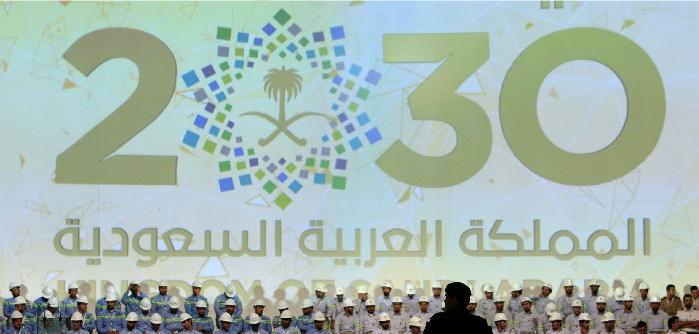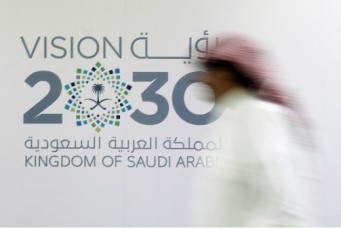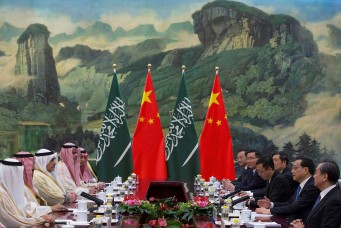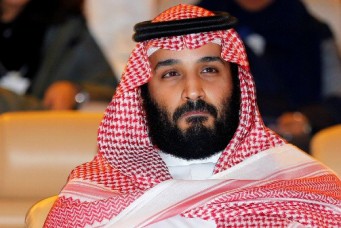Saudi Crown Prince Bets on Economy
The success of Mohammed Bin Salman’s “revolution” hinges on neither local nor foreign politics, but on whether Vision 2030 can create jobs for the Saudi youth.

Large banner shows Saudi Vision for 2030 as a soldier stands guard at the inauguration of several energy projects in Ras Al Khair, Saudi Arabia, Nov. 29, 2016. Zuhair Al-Traifi/Reuters
This week marks the twenty-fifth anniversary of Bill Clinton’s victory over George H. W. Bush, a notable presidential election that familiarized the political world with the mantra, “It’s the economy, stupid.” Coined by Clinton’s famed political strategist James Carville, it stated the simple truth that political strength is largely about jobs. That year, President Bush’s considerable foreign policy accomplishments ultimately mattered little in the face of the voters’ economic anxiety.
No two political scenarios are entirely comparable, yet as the world contemplates the astonishing developments emanating from Riyadh in past weeks, Carville’s principle largely applies. Time will tell whether the stunning moves made by Crown Prince Mohammed Bin Salman Bin Abdelaziz Al-Saud will prove genius or destructive. But ultimately his success or failure, and perhaps that of the Al-Saud monarchy with him, will hinge neither on royal court politics nor, most probably, foreign policy undertakings—but on jobs. Saudi Arabia’s biggest threat comes not from the Houthis, Hezbollah, or Iran, but from demographics. The Saudi population is increasingly young, urbanized, educated, connected, and with uncertain job prospects for the future, potentially restless and volatile.
Much has been written about the meaning and motivation of the purge of prominent princes, government officials, and businessmen, and the simultaneous Saudi machinations vis-à-vis Lebanon, Yemen, and Iran. The shocking developments have left pundits bewildered, with Western observers in particular quick to adopt the now-tired Game of Thrones simile. Certainly, deeper contemplation of internal Saudi Arabian politics and foreign policy—and the connection thereof—is important to understanding what took place, why, and what it could mean going forward.
Largely, however, analysis has overlooked the looming threat of economically-motivated popular unrest. Estimates show that 60 percent of the population is under 21, with a much higher percentage under 35. This huge pool of young Saudis, which has been exposed to the world and had access to quality education thanks to the King Abdullah scholarship program and other educational investments, has high hopes for the future. Thus, the real question is whether Saudi Arabia can absorb the millions of young men and women entering the job market. And if so, what kind of jobs will be produced? Will these jobs meet the rising expectations of this demographic bloc?
Many adjectives have been affixed to Mohammed Bin Salman’s leadership style so far: bold, decisive, progressive, impetuous, rash, foolhardy. The debate will continue in the coming weeks and months. But what is abundantly clear is that the crown prince is a gambler, and he has bet the house on the 2030 development plan. As advertised, the plan is visionary if not audacious. There has been much written about its potential impact in remaking Saudi Arabian society, possibly along the lines of the Emirates. But its core focuses on diversifying the Saudi Arabian economy and creating jobs. If successful, the plan would reduce the kingdom’s reliance on fossil fuels and the accompanying vulnerability to global price swings, and build a knowledge-based, competitive workforce. This daunting task must not be completed in a generation, but in little more than a decade.
Scores of consultants were involved in its construction, but Vision 2030 is owned by the crown prince. King Salman plucked him from relative obscurity in 2015, supposedly determining that his son was the only prince with the character and resolve to take on such a daunting—or foolhardy—challenge. Given his age and health, the king realized he would not be able to oversee the plan’s implementation. Salman could have opted for a more conservative, caretaker-type reign in which his government simply preserved the economic, social and political status quo. But this approach would have simply ignored structural problems that threaten the kingdom’s future. Prince Bin Salman and 2030 offered an alternative, a chance to save both monarchy and nation. Success of both man and plan relies on job creation.
Accordingly, this week’s developments can be best assessed by determining whether or not they make 2030’s success more or less likely. Judged on that basis, the arrests of many of Saudi Arabia’s most prominent businessmen, princes included, is cause for considerable concern. Ignore, if one can, their positions in Saudi Arabian society. Famous or infamous, they lack sufficient popularity within the kingdom to threaten internal political cohesion. But for better or worse, with their extensive international business contacts they serve as ambassadors—the face of Saudi Arabian business abroad. Their abrupt demise is unsettling to big business and international investors whom the kingdom is aggressively courting, and relying on, to help implement 2030.
This likely chilling effect, even if temporary, comes at the very time the kingdom is gearing up its Aramco IPO. Saudi Vision 2030 relies heavily on the expected revenues derived from this sale, and the enthusiasm of certain types of investors may diminish. And potential damage isn’t limited just to Aramco, but the multitude of other foreign investments sought by the kingdom. It is entirely possible that Bin Salman can successfully sell the anti-corruption argument and increase business confidence—but it will take time, effort, and resources.
The optics of a “palace coup” are very damaging in the short term. The traditional Saudi decision-making process, while cumbersome, deliberate, and tribal, was at least familiar and predictable. Eliminating prominent princes and officials may solidify Bin Salman’s position in Saudi Arabian politics, but it undeniably sends the message that the kingdom’s government is volatile. Saudi Arabia’s image-makers can ill afford to ignore this reality. Right now, it looks bad.
Saudi Arabian foreign policy bears a much more extensive examination, but the moves thus far—including Lebanon—have contributed to the perception if not reality of greater regional instability. This may be a temporary problem, but it can’t be denied. At an absolute minimum, increased regional instability, or the perception thereof, harms the investment climate upon which Saudi Vision 2030’s success is based.
As the proverb goes, a revolution is not a dinner party. Bin Salman sees himself as carrying out a popular revolution benefitting the youth. The arrests, removal of Mohammed Bin Nayef, crackdown on religious conservatives, liberalizing of Saudi Arabian society, and myriad of other less publicized decisions could have serious repercussions for the crown prince. He has created potentially formidable enemies, and may well have sown the seeds of greater opposition. Yet the Saudi Arabian public tends to be less concerned with who is in control than whether or not the government is delivering on bread and butter issues. For now, the people stand with Bin Salman because he offers hope—or a more dynamic society, and most importantly quality jobs.
David Dumke is the director of Middle East and South Asia Initiatives, University of Central Florida. On Twitter: @dtdumke




